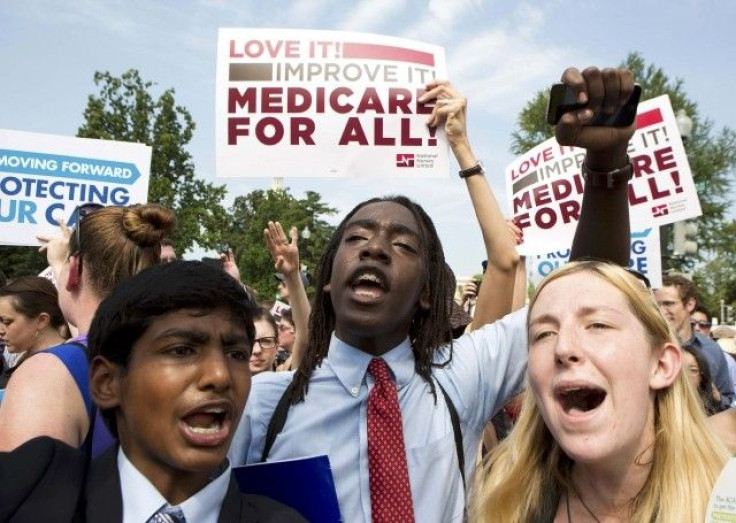Sick Americans Relieved At High Court Health Ruling

(Reuters) - Americans who were relying on a U.S. healthcare overhaul to provide them with health insurance heaved a collective sigh of relief after the Supreme Court upheld the law, which aims to extend coverage to more than 30 million people.
Gail Richardson, 59, of Stone Mountain, Georgia, has been uninsured since 2010 and has two autoimmune disorders. She earns $11,000 a year as a freelance writer, not enough to cover living expenses and the current monthly premiums for private insurance.
It's not like I need affordable insurance. I need free insurance, she said.
Under the Patient Protection and Affordable Care Act led by President Barack Obama, Richardson could be eligible for insurance under an expanded Medicaid program for low-income earners now that the highest U.S. court has rejected a challenge to the law's constitutionality.
But the court also ruled that states could opt out of the expanded Medicaid program, so whether Richardson will get insurance would depend on the decision of Georgia authorities.
The law represents the biggest revamp to the $2.6 trillion U.S. healthcare system in 50 years. It requires insurance plans to offer free preventive care services such as mammograms and other cancer screenings, remove lifetime limits on payouts by insurance policies and offer coverage for patients with pre-existing health problems who would otherwise be denied coverage.
The ruling means fewer worries for Marla Tipping's family, who live in Minneapolis and have insurance through her husband Bill's law firm.
Tipping's 15-year-old son Cam has a rare genetic disorder that causes him to produce extremely high levels of cholesterol. His treatment involves going to the hospital every two weeks to have his blood filtered.
We're greatly relieved. I think it's the right decision. It certainly impacts our family, Tipping said of the court's decision to uphold the law.
Cam's medical expenses are covered through group insurance the family purchases for about $20,000 per year. If they lost their current coverage, they would find it very difficult to find other insurance because of Cam's pre-existing condition.
Even given all of our good circumstances, when you have a child with an expensive condition to treat, you have to have a safety net, she said.
WON'T BE DENIED
Natalie Hough was 17 when she had a cardiac arrest in the bathroom of her high school in Hillsborough, North Carolina.
A classmate heard her struggling to breathe, and within minutes, school staff had restored her heart beat with a portable defibrillator. Diagnosed with a heart condition called long QT syndrome, she now has a small device implanted in her chest to protect against future episodes.
The total bill for Hough's care was half a million dollars. Luckily, she was covered under her parents' health insurance, so the family's portion of the bill was $5,000.
Hough's parents are self-employed and can afford the $1,300 monthly deductible for health insurance. But like many parents of older children, especially those with serious medical conditions, they worried about the Supreme Court's decision.
I now know my daughter won't be denied coverage for a condition she never brought upon herself, Hough's mother Libbie said.
Janine Jones of Placentia, California, suffers from juvenile rheumatoid arthritis and a chronic pain disorder known as fibromyalgia. She is on her parents' insurance, and has been worried about what the court's decision will mean for her.
Jones, 25, is one of the estimated 6.6 million young adults that were allowed to join or stay on their parents' health insurance because of provisions in healthcare law that have already gone into effect.
This has allowed Jones to move out on her own and attend college part time at California State University, Fullerton. She is nearly finished with her degree but with two pre-existing conditions, she has been worried about what comes next.
Jones says she contacted insurance companies to find out what her options would be if she was suddenly unable to stay on her parents' insurance plan.
One agent was pretty blunt. She said get a job, or marry someone with insurance, Jones said.
FINALLY, SOME CLARITY
Patient advocates, who for weeks had been bracing for a reversal of some or all of the law, were also elated with the court's decision.
John Seffrin, chief executive of the American Cancer Society, called it a victory for people with cancer and their families nationwide, who for decades have been denied health coverage, charged far more than they can afford for lifesaving care and forced to spend their life savings on necessary treatment, simply because they have a pre-existing condition.
Seffrin said the decision preserves vital provisions of the law that are already in place, such as improving the ability of people to get preventive services including mammograms and colonoscopies at no additional cost to patients.
Judith Stein, executive director of the Center for Medicare Advocacy, said the ruling is good news for people with Medicare, the Medicare program, and the millions of families who could not otherwise afford health care coverage.
Kitty Ruderman, 66, is a semi-retired administrative assistant living in New York City. She began receiving Medicare coverage in 2011, and gets regular treatment for spinal stenosis, sciatica, high blood pressure, high cholesterol, and occasional bronchitis.
Ruderman lives on Social Security and a small pension and says she watches every dollar. She has been worried about what would happen if she reached the doughnut hole - the gap in Medicare's Part D prescription drug program that starts when total annual drug spending exceeds a certain level.
The health overhaul law gives seniors in the doughnut hole a 50 percent discount on branded drugs and 7 percent on generics, with bigger discounts scheduled down the road. The plan has already saved more than $3 billion in Medicare prescription drug costs for older and disabled Americans.
I really needed this, Ruderman said.
(Additional reporting by Sharon Begley in New York; editing by Michele Gershberg and Mohammad Zargham)
© Copyright Thomson Reuters 2024. All rights reserved.











